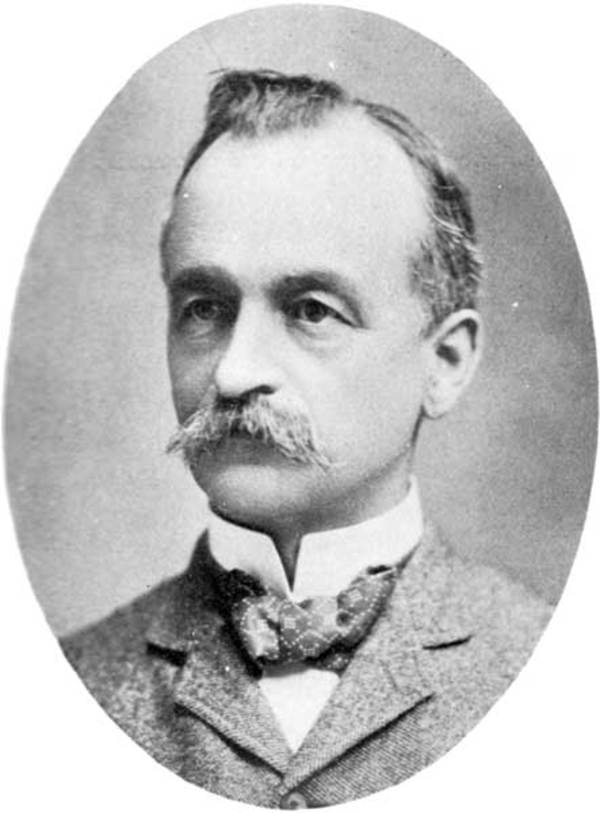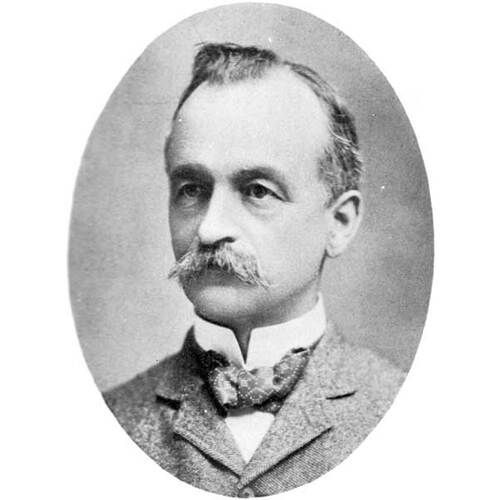
Source: Link
BROCK, JEFFRY HALL, businessman; b. 6 Jan. 1850 in Guelph, Upper Canada, son of Thomas Rees Brock and Eleanor Thompson; m. 6 Sept. 1876 Louisa Adelaide Clara Gillespie, and they had 12 children; d. 27 March 1915 in Long Beach, Calif.
Jeffry Hall Brock was educated in public and private schools near Guelph and briefly at the High School of Montreal, a department of McGill College. As early as age 15, he was selling at a book and stationery store near his home. He then spent five years with various dry goods firms in St Louis, Mo., and with R. G. Dun and Company in Troy, N.Y. After returning to Canada in 1872, he worked at the Toronto branch of Ogilvy and Company for his brother, William Rees, who was a partner in the firm. From 1876 to 1877 he was manager of J. Gillespie and Company, a wholesale dealer in hats, caps, and furs. Sometime in 1877 he went into partnership with his brother to form W. R. Brock and Brother, a wholesale dry goods business. Two years later he accepted an invitation from George Frederick Carruthers to move to Winnipeg and become a junior partner in his growing general insurance agency. In 1881 Brock also became general agent of the Canada Permanent Loan and Savings Company.
Like many other Winnipeg businessmen, Brock became politically active, siding against the National Policy of high tariffs and support for the monopoly of the Canadian Pacific Railway introduced by the government of Sir John A. Macdonald*. He opted for the Manitoba Rights League, which protested against the monopoly and called for free trade with the United States. A strong believer in equal access to the Canadian west by other, even American-based railroads such as the St Paul, Minneapolis and Manitoba [see James Jerome Hill], Brock was one of the founders of the Manitoba Liberal party and he became a leading advocate of Premier Thomas Greenway*’s Liberal government.
Brock’s extensive fieldwork and business connections brought him into contact with many farmers and business people, and a growing number of immigrant settlers in the expanding northwest. Capitalizing on rising western discontent with the high insurance premiums and the elevated rates for commercial loans and mortgages charged by eastern-based financial institutions, Brock seized the opportunity to start a local life insurance company that would offer cheaper rates and reinvest in the burgeoning western economy. With the support of prominent Winnipeg business leaders, including James Henry Ashdown*, Robert Thomas Riley, Daniel Hunter McMillan*, and Stephen Nairn*, and with sufficient capital from investors in both the west and the east, he pursued his goal. The Great-West Life Assurance Company was incorporated by act of parliament on 28 Aug. 1891. Winnipeg’s mayor, Alexander Macdonald, became the company’s first president and Brock was its general manager.
Initially, Brock had planned to supervise the new company on a part-time basis while maintaining his partnership with Carruthers, but he was soon captured by his creation. Great-West Life, which started as a single-table-and-chair operation in a side room of Carruthers’s agency, quickly gained support, not only in western Canada but in the east as well. By 1895, with the timely take-over of the Dominion Safety Fund Life Association of Saint John, Great-West had agencies in every province from British Columbia to Prince Edward Island.
The formula for such success was straightforward – cheaper rates and better local service. By reinvesting income from premiums solely into local farm mortgages, Great-West won in two ways: it undersold the competition by offering lower mortgage rates, yet such rates were sufficient to ensure a higher return on its investments than it could have realized on the eastern bond markets. This double advantage, in turn, allowed the company to charge lower premium rates than eastern-based companies. This winning formula, combined with Brock’s drive and energy as a salesman and recruiter, a policy of careful medical exclusion leading to incredibly low mortality rates among policyholders, and the early establishment of an actuarial reserve of four per cent meant that the Great-West was firmly rooted and poised for growth.
Consequently the Great-West was ideally prepared for the boom that saw the population of Manitoba alone grow from about 152,000 in 1891 to over 461,000 in 1911. The company rose with the economic tide, so much so that its share of the entire Canadian insurance sales market increased from 0.5 per cent in 1892 to 13.8 per cent in 1915 – an unparalleled rise in corporate fortunes in Canadian life insurance history. From this base, the Great-West Life Assurance Company went on to become one of Canada’s leading group and individual life insurance carriers.
Besides his work at the Great-West, Brock found time to act as a director of the Northern Trusts Company and the Northern Mortgage Company. He was nominated to the provincial board of health in 1893. For many years he served as a warden of his church, Holy Trinity Anglican Church, and as a delegate to synod.
Visiting California for his health in 1915, Brock died in a hospital there, having been predeceased by four of his children. He was buried in Winnipeg. Although the Great-West Life Assurance Company was a collective effort, seldom has it been given in Canadian corporate history for one man to live to see his work come to such relatively early, overwhelming prosperity.
Arch. of the Great-West Life Assurance Company (Winnipeg), Agents’ cash ledger-book, 1892–97; Journal ledger, 1899–1900; Alexander MacDonald, “Historical review of the Great-West Life Assurance Company” (1925) and “Review of the Great-West Life Assurance Company” (1925); Policyholder application reg., 1892–98; Provisional board of directors, minutes, 1892; Reassurance company reg., 1893–1908. Manitoba Free Press, 29 March 1915. R. E. Bennett, A house of quality it has ever been: history of the Great-West Life Assurance Company (Winnipeg, 1992). P. J. Brock, William Rees Brock, 1838–1917; paradise regained: an odyssey in Canadian business (Toronto, 1983). Brock family records, comp. A. M. Cawthra Brock (Toronto, 1927). George Bryce, A history of Manitoba; its resources and people (Toronto and Montreal, 1906). Can., Royal commission on life insurance, Report (Ottawa, 1907). Directory, Toronto, 1877–80. Robertson’s landmarks of Toronto: a collection of historical sketches of the old town of York from 1792 until 1833, and of Toronto from 1834 to [1914] . . . , ed. J. R. Robertson (6v., Toronto, 1894–1914). Standard dict. of Canadian biog. (Roberts and Tunnell).
Cite This Article
Richard E. Bennett, “BROCK, JEFFRY HALL,” in Dictionary of Canadian Biography, vol. 14, University of Toronto/Université Laval, 2003–, accessed December 29, 2025, https://www.biographi.ca/en/bio/brock_jeffry_hall_14E.html.
The citation above shows the format for footnotes and endnotes according to the Chicago manual of style (16th edition). Information to be used in other citation formats:
| Permalink: | https://www.biographi.ca/en/bio/brock_jeffry_hall_14E.html |
| Author of Article: | Richard E. Bennett |
| Title of Article: | BROCK, JEFFRY HALL |
| Publication Name: | Dictionary of Canadian Biography, vol. 14 |
| Publisher: | University of Toronto/Université Laval |
| Year of publication: | 1998 |
| Year of revision: | 1998 |
| Access Date: | December 29, 2025 |



